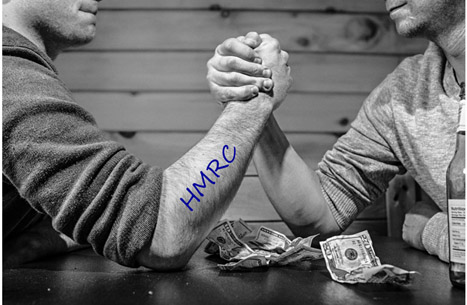Talking about TAX
Let’s start
We need to come clean, of the five contributors to Matthews Integrity Hub: HEAD OFFICE, none of us are tax advisers or would ever want to be. We are three technical people and two experienced management-types, one of whom admits to being a bit of a closet accountant, but no tax expert. We cannot, therefore advise you on what you should do about your tax affairs, all we can do is voice our personal experiences about tax matters gained from researching it, incurring it, trying to avoiding it and paying it, in that order. Treat all our ramblings on tax therefore as nothing more than tales from the power station portacabin, bar-room bravado or swinging of the naval story-telling lamp (if indeed they have lamps on offshore platforms).
TAX: talking about bravado
We’ve all met them. Heliport taxi-drivers, who regale you with details of past and current tax-avoiding exploits, repeated for emphasis, all claimed to be original and ingenious and closed to scrutiny from the dead hand of the tax authorities. Here are some of the wizard ruses we’ve heard only in the past year;
‘If you be switchin’ off yer mobile phone young fella, those tax snoopers don’t know where ever you are, so you can say you were outside the UK’
‘Me, I stashes my cash in the loft, they canna find it there’
‘They haven’t got the manpower to check up on NDE contractors, they’re too busy chasin’ dodgy builders and them foreign lorry firms’
‘My tax authority fellow is super, doesn’t work enough hours to be effective; he spends all his time in the golf club’
Well, false, false and false we reckon. As for the last one, if you ever get a job as a taxman (or woman) then here’s how to get promoted. Hang out at an expensive golf club for a while, listen to the banter from a seat overlooking the car park and watch who’s driving all the big expensive rides. Write down their registration numbers in your little red book. Next morning, check up on their owners’ tax returns and see if their declared income matches that type of expenditure. Simple as that. Amazing what you might find. The tax authorities would never do that of course.
TAX: talking about taste
‘It is your God-given right not to pay more tax than you legitimately owe’. You might hear this from your accountant, or even the tax authorities themselves, and strangely, it is actually true. Tax avoidance is perfectly legal (tax evasion is not) with the results that various avoidance schemes pop up. These include:
- Non-residency; living outside the country
- Country-hopping of a less residential nature
- Obfuscating your real job status (look it up)
- Offshore trusts and similar financial vehicles
We have nothing to say about any of these because we are not tax advisers. What we do know though is that whereas tax avoidance is legal, its bedfellow tax evasion is not, and will involve you in a lot of over-the-shoulder-looking.
The problem with tax avoidance measures is that people seem to get a taste for them .This goes for taxpayers/avoiders and their advisers alike. Accountants and lawyers like to stretch their application because it earns them fees and you like it because that saves you tax, at least in the short term. In the longer term it can lead to investigation of your tax affairs (HMRC can go back 6 years, or longer if they suspect irregularities) and you are left facing the investigation, with a large ‘estimated assessment’ which you have to prove wrong, whilst paying it anyway. Anyway, there is an easier way;
If you think about it, paying tax is sweet. There is nothing as sweet as having a store of hard-earned cash, all tax-paid and so with no-one looking over your shoulder. It doesn’t have to be the largest store around (that would be chasing the money-dragon) but just enough to get by and provide you with a bit of a safety net. If you take the correct frame of mind, you can amaze yourself just how mind-clearing the act of writing out that tax cheque can feel. That large sweet tax bill means that you have earned a large enough income to have incurred it, and our friends at the tax authorities are surprisingly good at making refunds if it is discovered you have paid a little too much. Pay what you legitimately owe, without messing around trying to take advantage of the margins, and you can stop worrying about it.
TAX: talking about risk
All tax authorities are large and unwieldy organisations, apt to make mistakes owing to the sheer number of individuals and companies they have to deal with. Most now work on a self-assessment system where the taxpayer effectively assesses their own amount of tax due (directly or indirectly) and this is taken as correct. This works fine for 90% of taxpayers, particularly those in permanent ‘staff’ employment or with very simple business income.
The problem comes when the taxpayer doesn’t play by the rules. Sitting on our desk is hard evidence of a £250 tax bill that has risen to more than £3000 with fines and penalties, caused by simply not responding to the request for payment over a couple of years. The fact that it was caused by changes of the taxpayer’s address and simply forgetting about the next annual tax return doesn’t matter; the twelve-fold (plus) amount due still stands, and has to be paid. Now extrapolate that over six years, and you can see how bills can become exponential. Not good news.
The temptation of course is to rely on the unwieldiness of the tax system to forget you, marginalise you to your own advantage, while they spend their time and effort chasing the multinational tax avoiders with their offices in obscure republics and islands. It can often work like this; the downside being that you come to forget the size of the guns that the tax authorities have.
In the UK, Her Majesty’s Revenue and Customs (HMRC) possesses a fine line in big-bore antique cannon. Finely polished over generations, they are the biggest shooters around by far, with police and other enforcement authorities wishing they had such large and unrestricted firepower as Her Majesty. This means virtually limitless power to investigate, disrupt, accuse and place estimated tax assessments on you and your business. If, perish the thought, they think you are not just stupid but have been consciously trying to deceive them, in cahoots with your hot-shot lawyers, then the larger parts of the arsenal will swing in your direction.
HMRC’s prolific leaflet-writing department (they seem to have leaflets for everything available on their website) contain lots of sobering statements about how tax avoidance schemes someone told you were HMRC approved and probably watertight probably aren’t. They’ll also tell you about the nice little ‘Accelerated Payment Notices’ that you might receive in the post.
Sentencing guidelines for being caught trying to fiddle HMRC make interesting reading, as long as you’re not on the receiving end. You could have a look at www.sentencingcouncil.org.uk/offences/item/revenue-fraud/ and decide if you want to be on the receiving end of some of that.
Read a pile of business books and they, quite rightly, concentrate on advising you to ‘learn the art of delegation’, ‘look after your customers’ ‘don’t run out of cash flow’ and stuff like that. To these please add; ‘don’t take risks with people carrying big guns, even if you think they are not looking’.
TAX: talking about YOU
We’ve seen in our linked articles how the freelance/contractor gig economy now runs the integrity industry. This brings with it practices of job-hopping, and country-hopping, and employment status which can be, shall we say, fluid. Cutting across all of this is the fact that you as an individual have personal responsibility for your tax affairs in the place where you live. If you use a tax adviser, an accountant, a solicitor or all three, the responsibility for the paying the correct amount of tax remains yours.
YOU get the tax assessment and are responsible for paying it
YOU get the estimated assessment if the tax authorities get confused as to how much you owe
YOU get the fines and penalties is tax is not paid as it should be
YOU have to foot the bill if your advisers get it wrong
It’s worth keeping this in mind
TAX: Serendipity
This is meant to be a gentle introduction to the subject of money so there’s no hard facts on tax rates, submission dates or whatever. In the age of the internet you can find these at the touch of a key. Remember that HMRC and other tax authorities produce leaflets on many of the subjects; they need a bit of selective reading but all the info is there somewhere. Then off you go to your favourite search engine to find other views on the subject. You can try searching for:
- Individual/business tax rates
- Tax arrangements for freelance/contract workers
- Tax fines and penalties
- Claiming non-domicile status
- I’m accused of VAT fraud, what happens next? (only joking, you should never look this up)
This article is the joint work of The Innovator and The Manager. We thank them for their contribution to Matthews Integrity Hub: HEAD OFFICE
Want to learn about the realities of grant funding in the integrity industry? Have a look at our article; The principles of free money








